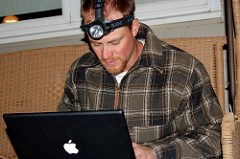I attended several copyright events last year, and also a meeting of copyright officers from universities around the UK. This is the first in a number of blog posts that I will write about these.
The first was arranged by SCONUL, and was held at Leicester University and delivered by Dr Jane Secker (LSE). The aim of this course was twofold: to explore the fundamental aspects of copyright, using the ‘Copyright: the card game’, and to look at the changes to copyright law brought into force during 2014. The original version of ‘Copyright: the card game’ (including the slides used in the course) is available from Jorum (http://find.jorum.ac.uk/resources/10949/19369). (Please note that when I used it at City University I adapted it somewhat – my slides are on our library shared drive.)
The day began with what was described as a ‘pub quiz’ (though we weren’t, sadly, in a pub!): apparently simple questions about copyright, but nonetheless containing information that might not occur to people. The questions included:
- What is the name of the legislation that makes copyright law?
- What sort of content does copyright protect?
- Do works that are copyrighted need to be registered in any way?
Many of you here at City have now played the card game, but for those who haven’t, the main questions that were asked and answered using it were:
- Why consider different types of copyright works? (In other words, why isn’t copyright the same for all types of work, e.g., novel, film, broadcast)
- What different types or aspects of works are subject to copyright?
- What different types of usages can works be subject to, which might be affected by copyright?
- What copyright licences are available, which allow works that are copyrighted to be used legally?
The second part of the day was concerned with the changes to copyright law that came into force during 2014. A lot of these changes focus on what are called ‘exceptions’.
What are exceptions in copyright? These are parts of the law which allow you to copy or do something that would otherwise be illegal, if it is for one of the reasons stated in law.
I have listed below some of the things that can legally be done that are most relevant to us, some of which were not previously permitted. I can provide more detail on request but just this brief overview seems most appropriate for a blog post.
- Research and private study
- Copies may be made under fair dealing of limited extracts of copyright works, for personal, non-commercial use.
- Up to 10% may be copied, but only as much as is strictly necessary.
- Now covers all copyright works including sound recordings and films (previously only literary, dramatic, musical and artistic works only)
- ‘No contractual override’ – cases where a resource supplier would forbid copying in the contract (which would otherwise override the CDPA). An example is that libraries can now supply other libraries with articles from electronic journals; previously most if not all publishers would not allow this. (Though I know some libraries are reluctant to use this exception.)
- Quotation (Criticism and Review)
- To allow ‘fair dealing’ usage of quotations for any purposes including ‘criticism and review’.
- Works must already have been made publicly available (which could mean having been performed or exhibited, as well as published, depending on the type of work).
- No contractual override.
- Copying for disabled users
- To allow suitable copies to be made of copyright works so that disabled users are able to access the works.
- Now applies to all disabilities/impairments (previously just visual impairments).
- Now covers all copyright works (previously only literary, dramatic, musical and artistic works only).
- No contractual override, but no mention of DRM measures (i.e., still can’t override these)
- Illustration for instruction
- Reprographic copying now permitted (previously copying had to be by hand)
- Fair dealing
- Covers all copyright works
- NB Examination exception – previously it was permissible to do virtually anything related to examinations without infringing the law. It is now limited to fair dealing, although it is far from clear what this means in practice. Other exceptions could still apply, e.g., criticism and review.
- Text and data mining
- To allow use of algorithms to determine relationships in data.
- Non-commercial use research or private study.
- Requires legitimate subscription/access to dataset.
- As above, no contractual override.
I’ll finish by saying that making decisions about copyright is usually more about assessing risk on a case-by-case basis rather than right or wrong. The term ‘fair dealing’ is mentioned above, and demonstrates this well, as you will see from an explanation of this concept at https://www.gov.uk/guidance/exceptions-to-copyright#fair-dealing which states that ‘There is no statutory definition of fair dealing – it will always be a matter of fact, degree and impression in each case’.
Image credits
- ‘Copyright (Washington DC)‘ by Takomabibelot (CC BY 2.0) Accessed from Flickr 08/10/2015
- ‘MacBook Data Mining (On a Porch Swing)’ by kmoney56 (CC BY-SA 2.0) Accessed from Flickr 08/10/2015


This information is very useful…. thanks for sharing…..
Engineering College Admissions 2016
Thanks for reading and commenting! It looks as though you might be reading this in India? – do bear in mind that copyright law may be rather different there!